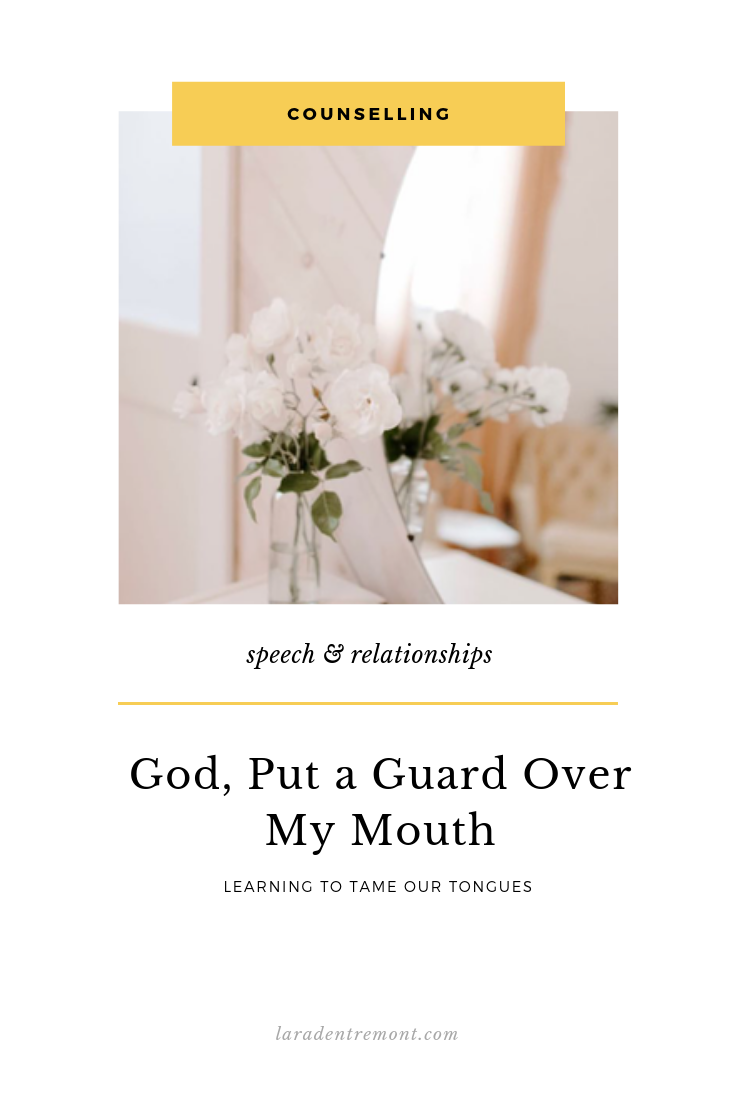God, Put a Guard Over My Mouth
My dog was always the first one to the door when we had guests. She usually knew they were pulling in the driveway before we did. It didn’t matter who it was, they were automatically an intruder—someone to be met with loud barking and jumping. Even once we reassured her their intent wasn’t to harm us and we welcomed them into our home, she kept a suspicious eye on them their entire visit, barking at each move they made to make sure they knew she was watching them. She was quick to assume, and it was always the worst, and she was quick to speak.
Though I don’t treat others quite like my dog did, I am often quick to speak in a similar way. If a question is asked, I want to answer it. If something unbiblical is said, I want to correct it. If a point is made I agree with, I want to respond in harmony. If a topic is raised, I want to be the first to voice my opinion. If something outrageous is declared, I want to reply to show its folly. I want to be the last one to speak in an argument, and I want to make sure my side is clearly heard. Like my dog, I am quick to jump over people with my words (whether written or verbal) and make them aware of my presence and thoughts with my words.
Last week I nearly published an article that was far too quick to speak. Out of reaction to a post on social media, I spewed my thoughts in a Word Document with biting phrases and snapping criticism. My arguments jumped all over the person’s well intentioned post and tackled it to the ground. Though part of my intentions were a love for truth, the other part sought to fulfill the longings of my ego.
I’ve noticed this to be a trend among those of us who love theology. Though I would (and have) argued that we need to pursue sound doctrine and speak out when falsehood is being promoted, there is also something honourable about lips that are slow to speak. I am learning more and more the value of being the last one to speak on issues, especially in a room of people much older and wiser than me. There’s value in taking time to re-evaluate and ponder what someone’s words could have meant before criticizing them. There’s value in listening to a person’s story before voicing our counsel, and value in hearing what others may have to offer for advice first. There’s value in letting an article sit in the draft folder for a day or two before hitting publish.
Even after being silent, I am learning that asking questions is better than making statements. Asking what others mean rather than assuming. Asking how others came to their conclusions. Asking questions to go deeper into someone else’s narrative rather than forcing my own in it. Asking questions of my own motives.
We all stumble, especially concerning our words (James 3:1-3). Our words are often flames, but not the refining kind—rather of the destructive sort.
Matthew Henry writes,
“‘Set a watch, O Lord! before my mouth, and, nature having made my lips to be a door to my words, let grace keep that door, that no word may be suffered to go out which may in any way tend to the dishonour of God or the hurt of others.’ Good men know the evil of tongue-sins, and how prone they are to them (when enemies are provoking we are in danger of carrying our resentment too far, and of speaking unadvisedly, as Moses did, though the meekest of men), and therefore they are earnest with God to prevent their speaking amiss, as knowing that no watchfulness or resolution of their own is sufficient for the governing of their tongues, much less of their hearts, without the special grace of God.” 1
If we desire to speak truth, beauty, and goodness, and put Christ on display, we need God’s special grace. James says that animals, like my dog, can be trained, but my tongue is far too wild for that (James 3:6-12). Only God can bridle the beast that is my tongue. That is why like the Psalmist, I am learning to often repeat this prayer:
“Set a guard, O Lord, over my mouth;
keep watch over the door of my lips!
Do not let my heart incline to any evil,
to busy myself with wicked deeds
in company with men who work iniquity,
and let me not eat of their delicacies!”
Psalm 141:3-4 ESV
Lord, please set doors over each of our mouths (and our keyboards), and teach us to open them only once our words are good and pleasing.
-
Henry, M. (1994). Matthew Henry’s commentary on the whole Bible: complete and unabridged in one volume (p. 944). Peabody: Hendrickson.

